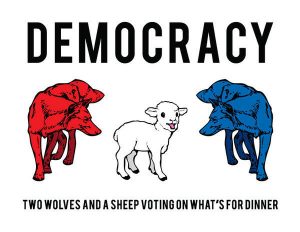
IPFS News Link • Holidays
A Fourth Question
• https://www.ericpetersautos.comToday is Independence Day, so it seems a good time to ask: How independent are we? Put another way: What are we free to do – and not do?
The dreary answer, of course, is . . . not very much.
Orwell wrote that freedom "… is the right to tell people what they don't want to hear." And also that two plus two equals four rather than five.
But there is a more foundational freedom and it comes in two co-equal parts. The first part is the right to say No. The second part – without which the freedom to say No is a functional non sequitur – is that your No be respected. In law. By law.
Americans have lost this freedom almost completely.
We are free to say, No of course – in the manner of a woman being raped … who is raped, regardless. The trouble is the rapist's indifference to the woman's protestations. The ineffectiveness of her No.
Americans used to be able to say No effectively.
They were once free to say No to health insurance, for instance. Which is a reasonable thing to say for many, such as the young and healthy – who can reasonably bet they won't require expensive medical treatment and so prefer not to spend their limited resources on expensive insurance.
The fundamental thing being that their right, as individuals, to say No was respected.
Whether you – or others – agreed with their decision being functionally immaterial. Other people were required to mind their own business – and leave you free to mind yours.
That principle is now soundly rejected by perhaps a majority of Americans – who believe because they say Yes others must be punished for saying No.
This has its ideological basis in the doctrine of majority rule, which forms the basis of democracy – something America was never meant to be. Which is another thing Americans, in general, no longer understand.
The very word – democracy – was considered almost pejorative by most of the Founders, who loathed the practice. It is nowhere to be found in the Declaration of Independence nor the Constitution, the latter allegedly the law of the land.
Or even, for that matter, the Pledge of Allegiance, which was written by a socialist.
It refers to the republic, not the democracy.
It is an important distinction. Republics respect the freedom to say No by accepting it without applying punishment or its threat – duress – for so saying. They acknowledge individual rights as not subject to a vote – no matter how many votes are taken.
Democracies – which is what the United States has become – require the subordination of the individual to the majority as a matter of principle. Which means the individual is only permitted to say No – without being punished – when the majority also says so.
































